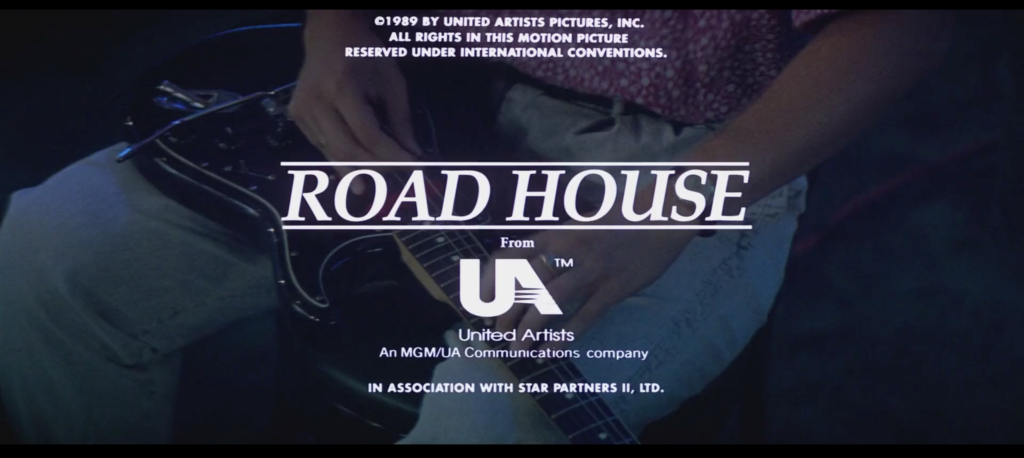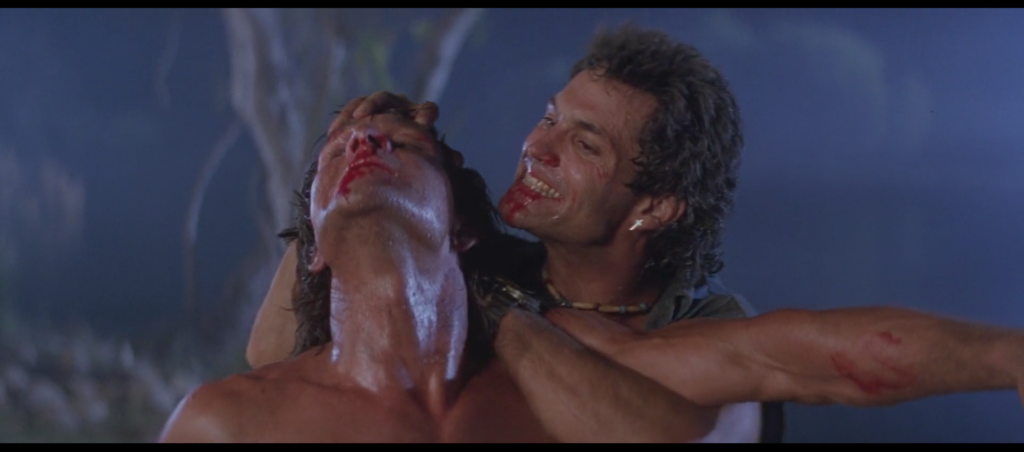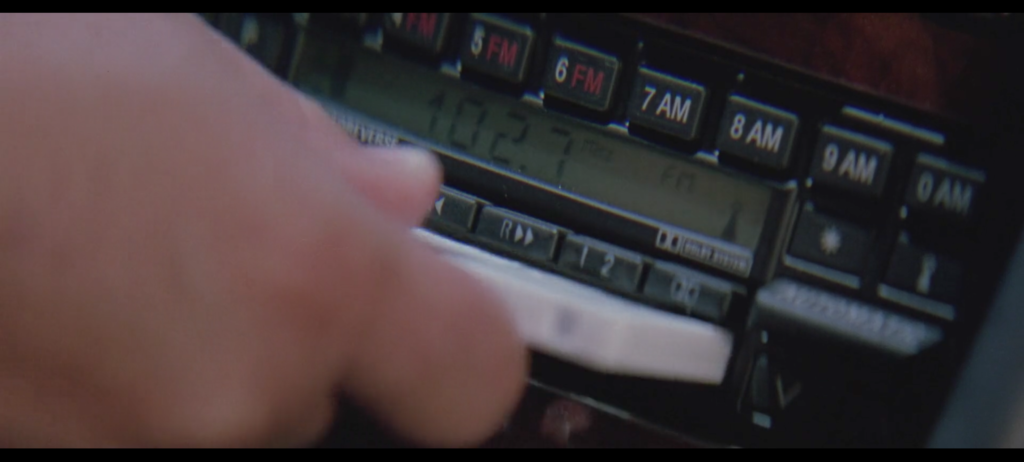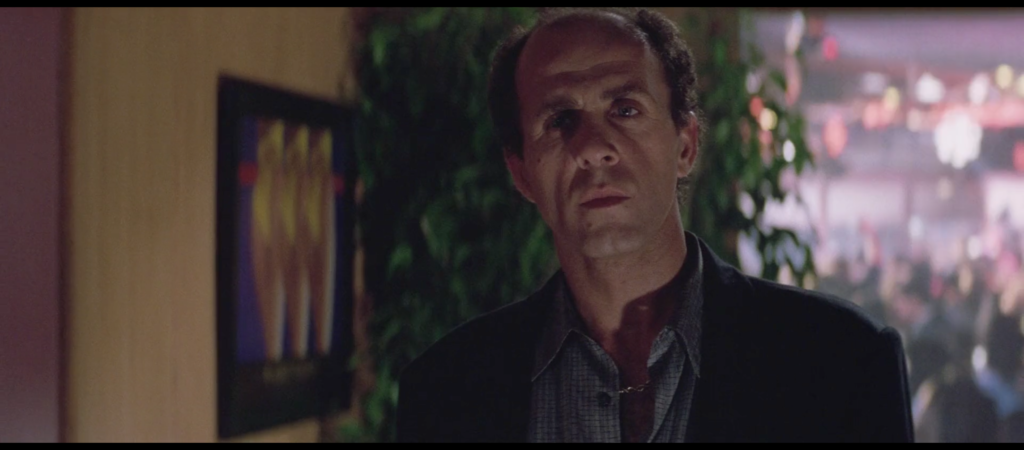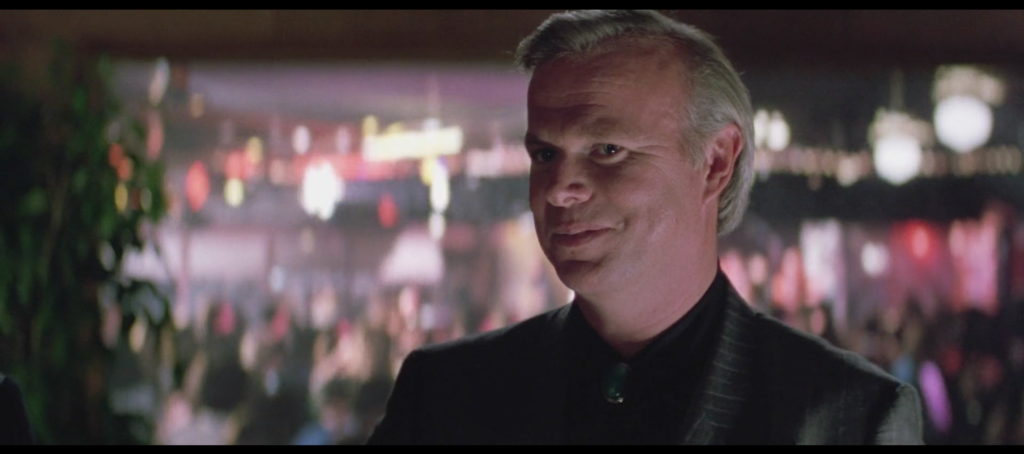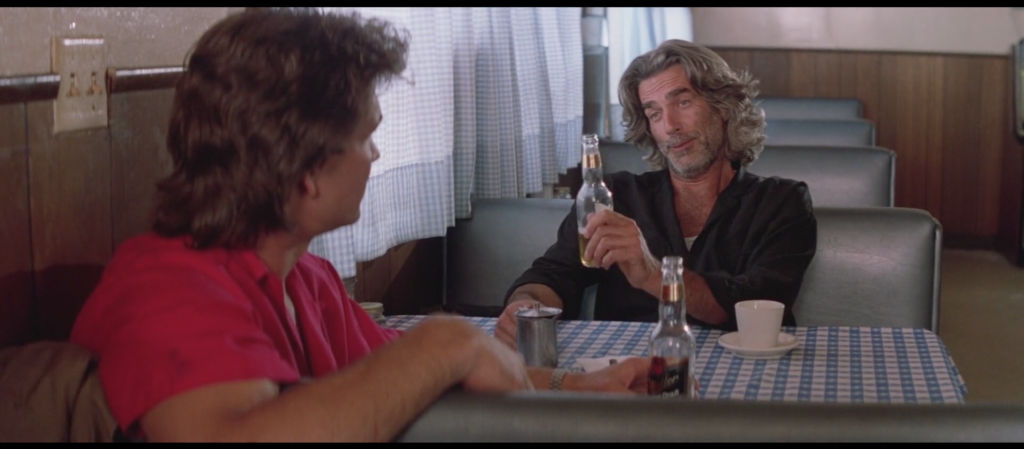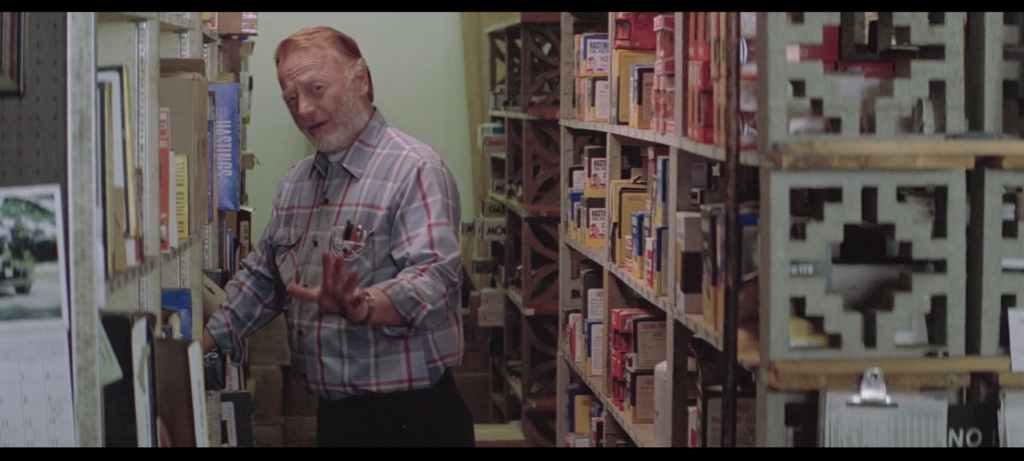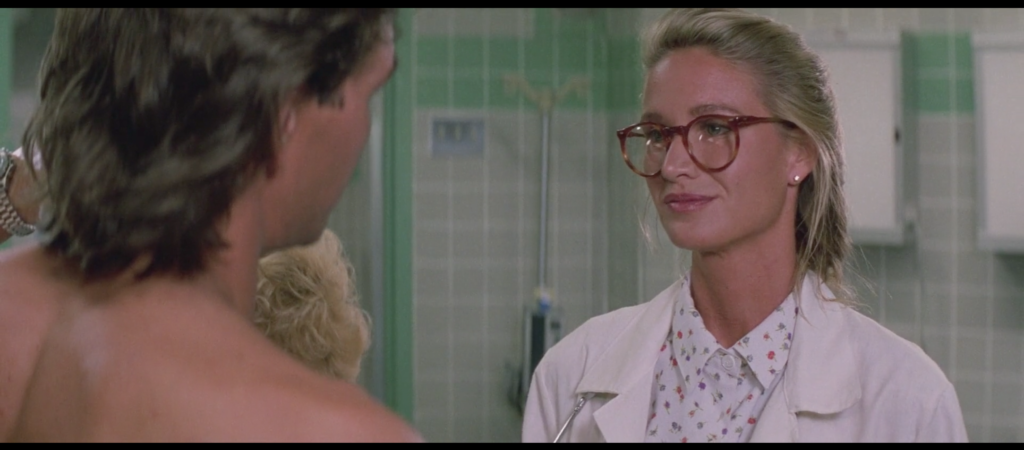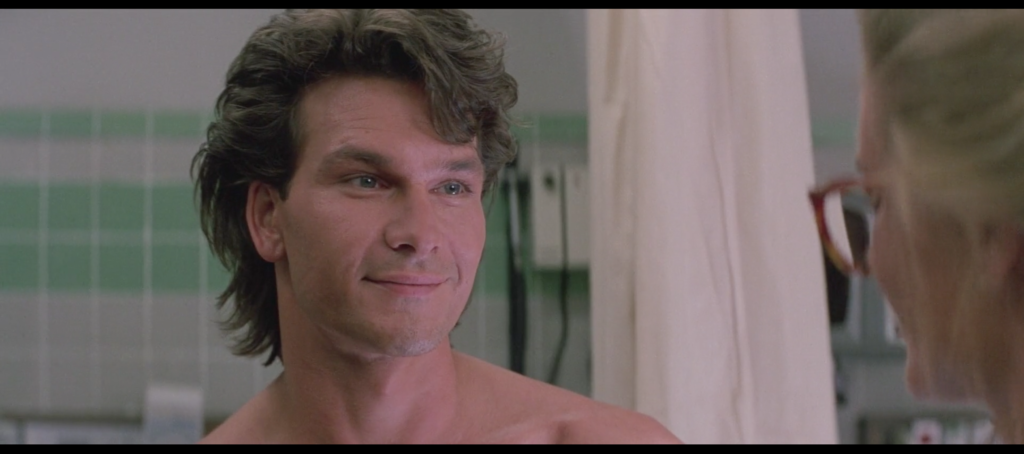Archive for the ‘Pain Don’t Hurt’ Category
357. Lap
December 23, 2019Road House closes up shop for good and all with the title superimposed over Jeff Healey’s crotch. Oh sure, you can say it’s a shot of his hands, or his guitar, or his hands on the guitar, but facts are facts. That’s the words ROAD HOUSE and that’s Jeff Healey’s crotch. It would be foolish to deny it.
And yet it’s nothing more than a return to form. The opening title of Road House is superimposed over a woman’s ass. That’s a communicative detail same as this is. They’re an indication that this movie is primal, instinctive, biologically raw. It’s about fighting, fucking, or fleeing, depending on the person and the needs of the moment. It’s a film about butts and balls. If Road House were a body part it would be someone’s bathing suit area. It makes sense to end this way. Leave us on a high note, Road House.
358. Jimmy, Revisited
December 24, 2019“I used to fuck guys like you in prison.” This much we know about Jimmy. Or do we? Picture growing up as Brad Wesley’s unacknowledged bastard son. Absent father, mother who doesn’t understand him. He starts hanging out with the wrong kind of kids, starts acting up, getting into trouble. A few scrapes with the law, a few misdemeanors, the specter of juvie on the horizon. Then it happens: he gets pinched for a big one, grand theft auto. He does time. And what happens to a handsome young man like Jimmy in prison? I don’t want to say it but I think we all know.
So. “I used to fuck guys like you in prison.” Is that a fact? Or is Jimmy identifying, in Dalton, the traits he grew to hate in himself, the traits he feels made him a victim, something he’s sworn he’ll never be again? The good looks, the great hair, the attitudinal softness, and most importantly the fact that he’s being beaten in this fight. He deserves what he’s gonna get, just like the old Jimmy deserved it, the Jimmy who existed before this new Jimmy emerged, harder and stronger and ready to dish out everything he’d been made to take.
359. But he can’t be a man cuz he doesn’t smoke the same cigarettes as me
December 25, 2019Before he pops in a cassette and listens to the tunes of his choosing on his way out of New York, Dalton’s radio is tuned in to 102.7, WNEW, the home of classic rock for a generation—a freeform rock station before “classic rock” even existed, back when “classic rock” was just rock—in New York. Scott Muni, Scottso, The Professor. Pete Fornatale. Carol Miller. That sort of shit. That’s the station I grew up listening to, via my father and then eventually on my own. For a while in the 1990s and early 2000s, I believe, it was a talk station, home of the shock jocks Opie & Anthony. Today I have no idea what it is.
But I cherish the idea that Dalton and I might both have listened to the same radio station at the same time. Why? Because how else am I going to connect with Dalton as a person, really? There’s the philosophy degree I suppose; I took a year of philosophy as an undergrad and remember it relatively fondly, though if asked me what I learned I probably couldn’t come up with much better than Dalton’s self-effacing “Man’s search for faith, that sort of shit.” But I’m not a dancer, I’m not a fighter, I’m certainly not a cooler let alone a bouncer, I don’t practice tai chi, I’ve never torn a man’s throat out, although I can think of one ex that was none too pleased I’ve never had sex with a woman while her ex actually watched, et cetera. The possibility that I listened to the same broadcast of “Roundabout” or “Suite: Judy Blue Eyes” or “Locomotive Breath” as James Dalton, the best damn cooler in the business? How could one ever put a price on something so precious?
360. Oscar, or the path not taken
December 26, 2019This handsome devil right here is Oscar. He owns the Bandstand, the New York nightclub where Dalton’s working at the beginning of the film. As such he serves as two separate object lessons. First, he provides us with a solid point of comparison for just how creepy Frank Tilghman looks in this opening scene. Take a look at the man above, then at the man below, and consider what it takes to make the man above look like the more pleasant alternative.
The second lesson pertains to something Dalton says moments before Oscar enters the room: “When the job’s done I walk.” He says this to Tilghman as a condition of taking the job at the Double Deuce; this is worth keeping in mind during the film’s final reel, as just up and walking away is not unheard of for Dalton and presumably for his mentor Wade Garrett too. The only issue is whether fixing up the Double Deuce but leaving Brad Wesley in control of Jasper constitutes the job being done. (I personally lean towards no, but then I’m not a cooler.)
Point is, you can look at the Bandstand—all that gold plastic, all those hundreds, no chickenwire around the stage—and deduce that, despite the fact that he was stabbed moments earlier, Dalton has finished the job. Certainly his bouncers are competent enough to help escort the knife nerd who cut Dalton outside and then just…prevent him from returning—an ideal bouncing maneuver according to Dalton’s Three Simple Rules. There’s nothing left for those men to learn from Dalton, ergo he can take Tilghman’s offer and split on the spot.
But there’s a world out there somewhere in the multiverse where Dalton continues to work at the Bandstand, fending off further attacks from the knife nerd. Perhaps he’s a low-level drug runner for one of the Five Families, and the mafia tries to move in on Oscar. Maybe Dalton winds up having to fight off various assassination attempts from hardened killers instead of Wesley’s goon squad. Maybe a horse’s head winds up in his bed. Dalton vs. the mafia is a movie I’d watch, and a prequel we deserve.
362. Wade, reexamined
December 28, 2019You don’t become the best damn cooler in the business without making a few enemies. For Dalton, this is literally true: If he hadn’t made a few enemies, he’d still be the second-best damn cooler in the business, no matter what Frank Tilghman might call him. It took a gaggle of goons to take his mentor Wade Garrett out of the running and leave Dalton with the top spot.
Could it have gone down any differently? Let’s say Frank Tilghman got over his ageism and hired Wade rather than Dalton, even though he was getting old. Would Wade have wound up in a war with Brad Wesley, one that required bringing in his old pal Dalton to win?
It’s easy to see Wade taking control of the Double Deuce, winning over the staff and clientele alike with his grizzled charm. It’s easy to see him coming out on top in a few fights, against goons who’d underestimate him until he taught them who he was the hard way.
But it’s more difficult to imagine him getting attached to Jasper, or tied down by its chief resident, Dr. Elizabeth Clay, enough to go to the mattresses over it all. Sure, he’s fond of the Doc’s “attitudes,” so to speak, but…well, the Doc would be okay if Wade Garrett took a powder. At least that’s what he’d tell himself. And certainly the likes of Red Webster and Pete Strodenmire are big boys who can take care of themselves.
But I like to think that if the situation were reversed, and Wade Garrett were forced to call in his friend Dalton to help him clean up the Double Deuce with the same unfortunate results, Wade would understand his protégé’s convictions. Would he stand by and let Brad Wesley’s murder of his mijo go unavenged? I think we can glean the answer from the fact that he showed up and stuck around in the first place.
Wade Garrett may not have meant to teach love to Dalton, but Dalton learned it from the old man nonetheless. He learned it from his love for Wade Garrett—and as Wade says, Dalton taught him as much as he taught Dalton. May we all learn their lessons. For all that cooling is a cold business, it does not go untouched by the heat of anger, or the warmth of love.
363. Red again
December 29, 2019“Tire irons? Sure, I got tire irons. Got more than I know what to do with, I suspect. Thought I’d be out of business for good when the place burned down. Blew up, more like, but that raises questions I ain’t sure I wanna answer even now. Anyways, turns out my niece got the place covered. Insurance got things up and runnin’ again, I guess, but it were the money from the Jasper Improvement Society’t made it what it is. Now I’m up to my eyeballs in tire irons. Hell of a thing. Who can explain it. Ah, I’ll tell you: Frank Tilghman, that’s who. When the smoke cleared after that bad bit o’ business with Brad Wesley, look whose name was on the Improvement Society’s paperwork? Oh, it’s all legal-like. Stipulation in the contracts saying whoever owned Jasper’s most lucrative business owns the Society too, lock stock and so on. Well, with my place in ruins, and Strodenmire still vacuuming up the shattered glass from what went down during Wagon Days, and Emmet’s moonshine distillery up in smoke, the Double Deuce was the last place standing. He gave me the loans, made the place ten times bigger and better than it ever was, and all I owe him is a piece of my soul. Makes you wonder how much ol’ Frank knew when he hired that boy Dalton to clean house. Him? Good kid. M’niece, she thinks he hung the moon and stars. Couldn’t come through in the clutch, though, when the time came. Left it to me and the other old farts to finish what he started. Then again, maybe that was part of Tilghman’s plan too. Make us all complicit, if you don’t mind me usin’ a Sunday puzzle word. Blood on everyone’s hands, so to speak. We’d’a gotten nowhere if it hadn’t been for Dalton taking out Wesley’s goon squad. Maybe that was the plan all along. Now instead of me kicking Wesley some money under the table, Frank Tilghman reaches across the table and takes it right out of my pocket. Thought about bringin’ it up with Dalton during a family dinner, but the kid had about as much as he could take, losin’ his mentor and all. Who’s gonna tell him he did it all for a worse villain than Wesley was? Not me. I seen enough men broken down to ever relish the idea of breakin’ down another one. Hell, I see one every time I look in the mirror. Don’t that beat all. In fairness, Frank lost someone close to him too. We all seen the way he looked at that Pat McGurn kid before things went south. Don’t know why he felt he had to keep it a secret. We’re a forgiving bunch. When the fire department discovered Emmet’s collection of hand-drawn erotica, why, we all just let it slide. Didn’t even tell him the Milo Manara influence was too pronounced, and that woulda been the god’s honest. And hell, when I was married, how do you think my wife found the ugly man she left me for? “The lifestyle,” that’s what we called it. I don’t know about the style part, not when the fella’s wearin’ crushed velvet shirts every damn day, but it was a life alright, that it was. Worked out for the best, I suppose. They’re ugly ‘n’ happy together, just like Dalton and Elizabeth are pretty ‘n’ happy together. ‘Together,’ that’s the important thing I guess. God bless ’em. Not that I’m a religious man, you understand. Been doin’ that tai chi with Dalton in the mornin’, though. Clears the head. Maybe that’d be the time to tell him about Tilghman. Hell, I dunno. That’s a sacred time, if you ask me. Probably best just to let it be. Like I said, some questions don’t want answerin’. Valvoline’s in aisle three.”
364. Dr. Elizabeth Clay’s new life
December 30, 2019“You’re a bouncer.”
“Mmhm. Double Deuce.”
“Nice place. They send a lot of business my way.”
“I’m hoping to change that.”
“All by yourself?”
We get our first closeup of Dr. Elizabeth Clay on that last line of dialogue—”All by yourself?” Her smile at that moment is kind, but it’s the kindness of a skeptic trying to be polite with their skepticism. The Doc doesn’t believe Dalton will clean up the Double Deuce all by himself, though not because of anything Dalton has or has not done. She doesn’t believe anything worth doing can be done by oneself.
Think of the several times she tries to take Dalton down a peg. She does it when he talks about his job during their first date: “Somebody has to do it….Might as well be you.” Her doubt drips off every word, and while she’s quick with a rhetorical napkin, she can’t control all the spillage. What makes Dalton so special? In this regard, nothing that she can see.
Think of when she confronts Dalton about his escalating war with Wesley. “You don’t know him,” she warns Dalton; the implication is that he needs the knowledge she can impart. It has to be a team effort or it’s doomed to failure. Think of how she continues: “Who’s this for, anyway? Are you doing it for them? I don’t think so. You think you’re gonna save these people from Wesley? Well who’s gonna save them from you?” She shrieks that last line, because it gets to the heart of the issue here: Dalton’s messianism has no currency in her world. A doctor is always part of a team, and no doctor saves a life singlehandedly. Again, what makes Dalton so special? In this regard, still nothing.
This is what will make Dr. Elizabeth Clay the ideal mate for James Dalton as their lives continue after the closing credits roll. She will temper his idealism with pragmatism, leaven his savior complex with the value of teamwork, of solidarity between the likeminded, of delegation and deliberation.
The beauty of it is that unlike Brad Wesley, Dalton is a person capable of listening and learning. Certainly Doc is attracted to fixer-uppers or she’d never have married Wesley in the first place, though given their age difference there were obviously other dynamics at work. (Elizabeth is an orphan, for instance, and as Wesley’s boys can attest he’s a dark father figure.) And Dalton is a learner, a seeker. His degree from NYU shows he’s searching for answers, and despite having boiled down his knowledge into three simple rules there’s nothing to suggest he’s not open to learning more. Indeed, it’s precisely when he gets his back up and refuses to listen to Doc that things start going poorly for him. We’re meant to see that as anomalous; the real Dalton, however much pressure he puts on himself to “never lose,” listens.
And what does Dalton offer the doctor, besides a beautiful smile, remarkable hair, a bod that won’t quit, and a teaching opportunity? The chance to step outside herself and experience a side of life she’d kept at arms’ length. The Double Deuce sent a lot of business her way? Well, why not learn why? What drives a man to commit to bodily stopping trouble? What kind of mind expands that remit to an entire town? She can learn at her leisure even while tempering Dalton’s hard edges, while he does the same for her.
It’s a beautiful relationship when you really look at it. Two people, so different in so many ways, but a lock and a key are very different too. It’s the difference that makes it work.
365. Dalton
December 31, 2019Dalton runs the show. Completely. It’s his way or the highway. What he says? Goes. He’s a philosopher—man’s search for faith, that sort of shit. He’s not a nice guy. He has three simple rules, but he’s only good at one thing: He never loses. He’s pretty much always better than they are. He’s never really been put down. He’s ready for trouble. He knows nobody ever wins a fight. He lives some kinda life. He’ll keep you in the good graces of the church. He appreciates his devoted fan club. He’s not facing anything he’s not used to, but it’s amazing what you can get used to, isn’t it? He killed a man in Memphis—ripped his throat right out—and he said it was self-defense at the trial. He’s got balls big enough to come in a dump truck. If you fuck with him, he’ll seal your fate. He takes his coffee black and leaded. He thinks it’s time for you gentlemen to leave. He’s fuckin’ Dalton, man. He wants you to be nice until it’s time to not be nice. He’s the best damn cooler in the business, and he knows pain don’t hurt.
When I first wrote about James Dalton, I focused on his notoriety. As the second most famous bouncer in the business, his reputation preceded him. That, and his youth relative to his mentor Wade Garrett, is what got him the gig that made Road House happen as a story. But when you get to know Dalton, really get to know him as we have over the past 365 days, it’s not fame that drives your affection. It’s familiarity. Spend enough time with Dalton and his personality becomes as dependable to you as a granddad’s pocketwatch. Over time Dalton begins to make sense to you the way any of your friends make sense. Do all the parts of their personality fit together neatly? Probably not. But you can see how to get there from here, usually. And the elements that really stand out as jarring simply rearrange the rest around them until the picture clears up again. All the contradictions resolve. All the flubs in the script become endearing quirks. You start to make sense of the nonsensical until you marvel that it ever didn’t make sense to you to begin with. Three parking scenes? Why, Dalton is a thorough man, that’s all. Dumping a polar bear on a guy? Did not also Christ demonstrate mercy? Some see shirtless tai chi and ask why; we ask, why not?
It isn’t really pain that hurts, in the end. It’s the uncertainty that attends pain. How long must I endure? How bad will it be, and will it get worse before it gets better? Give me answers and I can take it. Road House gives you the answers you seek—it’s just a matter of figuring out the right questions to ask, and Dalton is our guide to them. That’s the story of Road House, a film I’ve now written some 150,000 words about, give or take. Doing so is how I made sense of something that makes no sense. “If you think this sentence is confusing, then change one pig.” I did it, mijo, and so can you.
—
This concludes Pain Don’t Hurt. Thank you for reading.
STC vs. Struggle Session vs. Road House
April 16, 2020I’m back on the terrific Struggle Session podcast this week, as the gang and I take a look at a movie close to my heart, Road House. This was a fun as hell discussion and I hope you enjoy it!
PAIN DON’T HURT PAPERBACK EDITION ON SALE NOW
February 19, 2021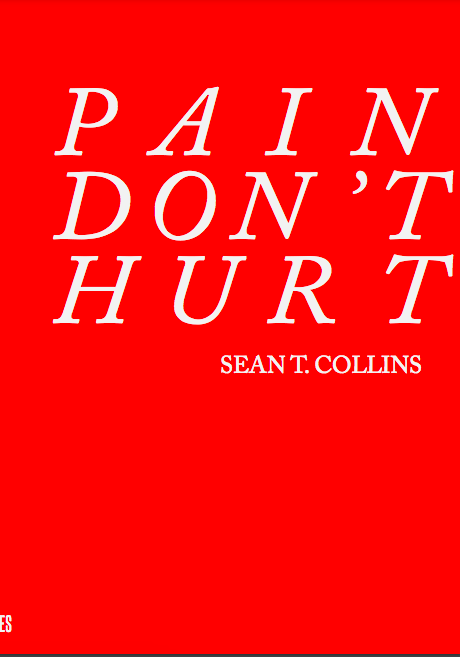
A limited number of signed copies of Pain Don’t Hurt, my book about Road House, are now available at Matt Zoller Seitz’s online store. If history is any indication they’ll move fast. Go get ’em!

